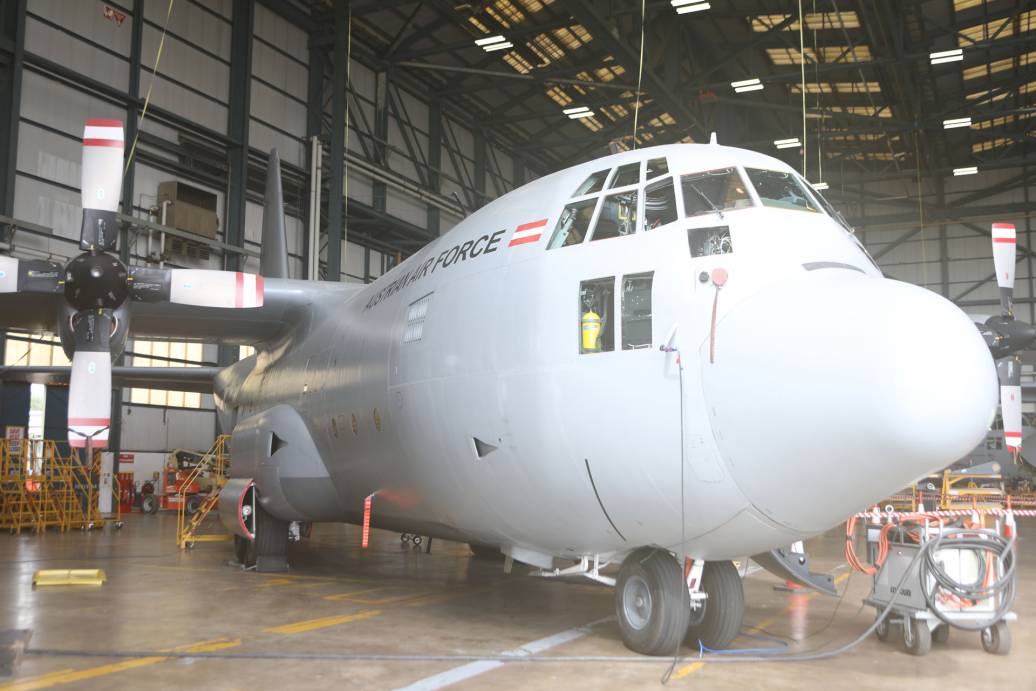Marshall’s engineering team has completed a series of modifications to enhance the navigational capabilities of the Austrian Air Force (AAF)’s fleet of three C-130K aircraft. The AAF has been a Marshall customer since 2003, after purchasing three former RAF aircraft from the UK Ministry of Defence. Marshall had previously carried out extensive modifications aiming to address obsolescence, regulatory and operational requirements, including the installation of a new flight management system (FMS) and night vision imaging system (NVIS) in 2017. The final aircraft to receive these upgrades departed Marshall’s Cambridge headquarters on Friday, 30 August, following a visit by a delegation including the Austrian Ambassador to the UK. Having flown the upgraded aircraft for several years, in 2020 the AAF identified a number of new areas to improve navigation functions and availability, and proposed a joint investigation and development project with Marshall to design a bespoke suite of modifications.
Requirements identified by the Austrian Air Force:
- Coupling the GPS landing system sensor units (GLSSU) approach capability to the flight director/autopilot
- Changes to the magnetic heading display
- Display of computed air release point (CARP) profile on the multi-function display (MFD)
- Display of vertical speed on the integrated secondary flight display (iSFD)
- Second bearing pointer on the electronic horizontal situation indicator (EHSI)
Once the upgrade package had been agreed, the installation of the new and upgraded equipment on to each C-130K aircraft was carried out by Marshall in Cambridge. Marshall subsequently conducted a thorough test programme to verify correct installation and operation, including avionics rig testing, ground testing, and flight testing. Once verification and certification had been completed, the aircraft were released to the AAF.

“These upgrades for the AAF are a perfect example of our end-to-end engineering capabilities in action. Building our excellent working relationship, we were able to partner with the customer all the way from defining operational requirements through to developing a bespoke programme and testing and certification. This programme also demonstrates how the useful lifespan and capabilities of a legacy aircraft can be maximised through a carefully-planned cycle of upgrades,” Gareth Williams, Chief Operating Officer, Marshall said.
“It was a pleasure to visit Marshall’s headquarters in Cambridge and learn about the upgrade work the company has been performing on our C-130 fleet. This kind of programme is a perfect example of the enduring defence partnerships our nations have built together for decades,” Ambassador Wrabetz said.
“We are proud of the strong relationship the AAF and Marshall have cultivated since 2003, “The completion of this major navigation upgrade is a testament to the capabilities and expertise of Marshall’s team, and will yield significant operational benefits for our C-130K fleet,” Col. Weichselberger said.
Two days before departure of the final aircraft from Cambridge, Marshall hosted a visit by His Excellency Mr Bernhard Wrabetz, Austrian Ambassador to the UK. The Ambassador was joined on the visit by Military Attaché Col. Wolfgang Weichselberger and the aircraft flight crew, who toured Marshall’s hangars before meeting with the engineering team’s leadership and technicians. Marshall has a strong pedigree of carrying out avionics and navigational upgrades on legacy C-130 aircraft. Recent examples include a highly complex cockpit upgrade programme for the Royal Netherlands Air Force, and an ongoing series of ADS-B and secondary flight display modifications for the South African Air Force.












